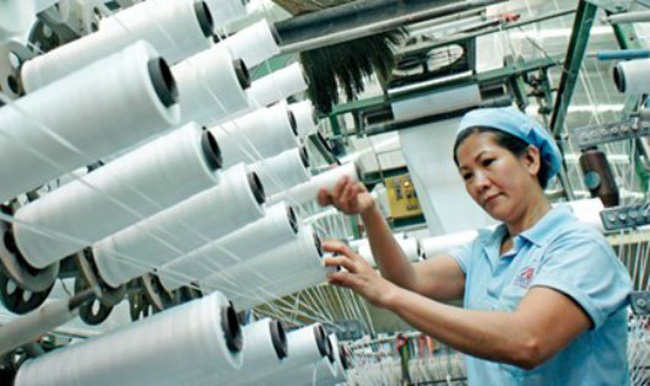Garment and textile enterprises’ qualms over new wage and social insurance policies
 |
| Garment and textile manufacturers urge the removal of the minimum wage increase |
At the October 4 conference on estimating the impacts of labour, wage, and social insurance policies on garment and textile enterprises organised by the Vietnam Textile and Apparel Association (Vitas) in Hanoi, representatives of organisations and enterprises in the garment and textile sector expressed concerns over the minimum wage increase as well as social insurance policies due to their negative impact on their manufacturing operations.
According to a representative of Nguyen Hoang Garment Co., Ltd., the new wage and social insurance policies, which will come into effect from early 2018, are considered a burden preventing the development of garment and textile enterprises in general and Nguyen Hoang in particular.
Nguyen Hoang’s representative stated that almost all enterprises present at the processing stage with low profit, while salary expenses make up approximately 70 per cent of the total manufacturing expenditure, thus further wage increases will increase manufacturing expenditure, and product costs, in turn. Thereby, enterprises will find it difficult to find orders.
Besides, we have seen consecutive increases in the minimum wage without the appropriate evaluation of its impact on labour productivity.
According to statistics released at the conference by Truong Van Cam, vice president of Vitas, in 2008-2017, the government adjusted the minimum wage ten times with the average annual growth of 21.9 per cent for domestic enterprises and 15.2 per cent for foreign invested enterprises.
Meanwhile, in 2008-2016, we saw the annual average growth of 5.96 per cent in gross domestic product (GDP), 8.7 per cent in consumer price index (CPI), and 4 per cent in labour productivity. These statistics reinforce enterprises’ panic on the minimum wage increase schedule.
Along with the minimum wage increase, the new regulations on social insurance, especially the extension of subjects participating in compulsory social insurance, also causes enterprises worry for to its impact on manufacturing expenditures.
Accordingly, the new regulation add people working under labour contracts with a term between one month and less than three months to be covered by compulsory social insurance.
Hoang Minh Khang, deputy general director of Hanoi Textile and Garment JSC (Hanosimex), stated that the new regulation on social insurance will add to enterprises’ financial burdens. Thus, adding this group to those covered by compulsory social insurance will not only increase manufacturing expenditures but also cost enterprises time to completing administrative procedures.
Responding to the minimum wage regulation, Khang said that Vietnam should remove this regulation because in competitive markets, enterprises offering attractive wages and allowance policies will recruit high-quality employees, while those failing to meet workers’ demands will struggle to retain or recruit employees.
Previously, at the workshop themed “Labour Productivity and Wage Growth in Vietnam” organised in September, Truong Dinh Tuyen, former Minister of Trade, now Minister of Industry and Trade, said that local authorities need to remove the minimum wage policy and permit enterprises and employees to negotiate employees’ income among themselves, while skilled employees need to be encouraged to increase their labour productivity via wage increase.
If this policy comes into effect, it will increase competition between enterprises, forcing them to voluntarily increase wages.
What the stars mean:
★ Poor ★ ★ Promising ★★★ Good ★★★★ Very good ★★★★★ Exceptional
Latest News
More News
- Kim Long Motor and BYD Battery start electric vehicle battery plant in Hue (January 28, 2026 | 09:56)
- SHIFT project launched to steer capital towards green growth (January 28, 2026 | 09:52)
- Haiphong steps up supporting industry ecosystem efforts (January 27, 2026 | 16:09)
- Century Synthetic Fibre inaugurates Unitex factory in Tay Ninh (January 26, 2026 | 16:03)
- SLP supporting Vietnam in closing FDI-related gaps (January 26, 2026 | 10:06)
- UK–Vietnam partnership advances BIM centre for railway development (January 24, 2026 | 11:20)
- Nghe An issues criteria for Quynh Lap LNG plant selection (January 22, 2026 | 20:20)
- Vietnam as a manufacturing hub: why on-the-ground inspection matters (January 22, 2026 | 11:47)
- 14th National Party Congress: Building Hue into distinctive international cultural, tourism hub (January 22, 2026 | 09:27)
- British rail businesses strengthen cooperation in Vietnam (January 21, 2026 | 18:10)

















 Mobile Version
Mobile Version